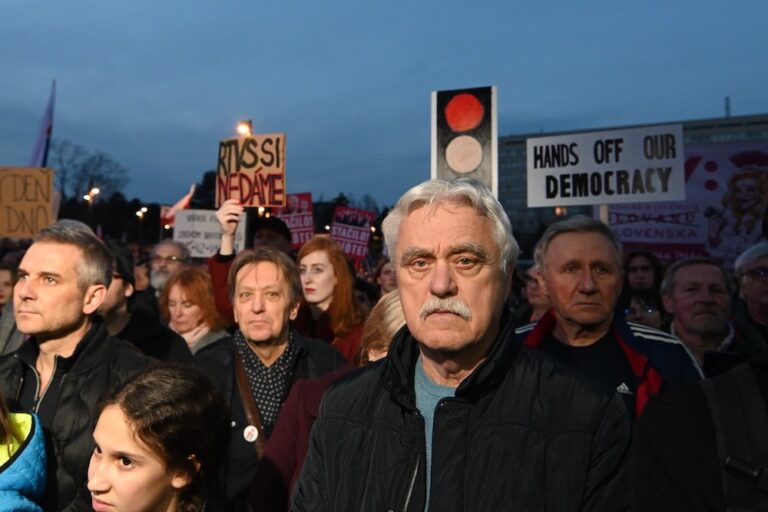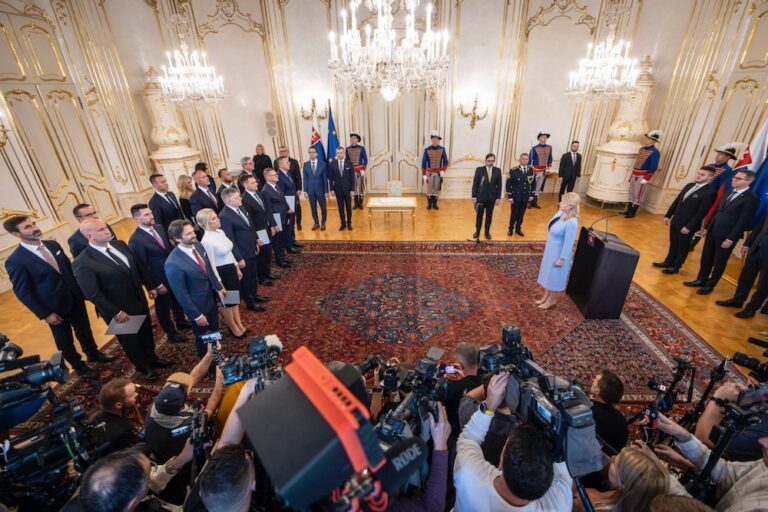In addition to hindering the detection of corruption, the proposed changes would make Slovakia the only state where whistleblowing does not trigger protection unless the government agrees that exposing its own corruption is a 'necessity'.
This statement was originally published on article19.org on 9 January 2024.
ARTICLE 19 joined a coalition of international civil society organisations in signing a joint letter calling on the Slovak Parliament to reject proposed changes to the Whistleblower Protection Act. The proposed changes would severely limit whistleblower protections and significantly hinder the detection of corruption crimes and the sharing of information in the public interest. The changes would also make Slovakia the only state where whistleblowing does not trigger protection unless the government agrees that exposing its own corruption is a ‘necessity’. Read the letter below, and use the link at the bottom of this page to view all signatories.
SENT BY EMAIL TO:
Minister of Justice of the Slovak Republic, Mr. Boris Susko
Minister of Interior of the Slovak Republic, Mr. Matúš Šutaj Eštok
Speaker of Parliament of the Slovak Republic, Mr. Peter Pellegrini
All Members of Parliament of the Slovak Republic
8 January 2024
Dear Ministers, Speaker and Members of the Parliament of the Slovak Republic,
We, the undersigned organisations, are writing to you to express our serious concerns about proposed legislation – developed in secret – that would severely limit whistleblower protections in Slovakia. We seek your support in rejecting this new legislation and ensuring that Slovakia remains a European leader in protecting whistleblowers in the public interest.
On 6 December 2023, the Slovakian government sent legislation to Parliament that would eliminate whistleblower protection for police officers and cancel minimum free speech rights for everyone else based on the introduction of arbitrary, subjective judgments not contained in the European Union Whistleblower Directive. Indeed, the secret process of preparing this legal retreat may violate the EU’s Conditionality Regulation and could threaten funding to Slovakia.
ELIMINATING WHISTLEBLOWER PROTECTION FOR POLICE
The new language would amend current law to delete protection as follows:
§ 25aa Transitional provisions to the changes effective on the date of promulgation/adoption.
(1) The protection afforded to a whistleblower who is a member of the Police Force ceases on the date on which this Act comes into force.
(2) The protection afforded to a whistleblower before the date of commencement of this Act shall continue to be maintained only if it meets the conditions laid down in this Act.
The government defended the change with the following explanation:
This change is in line with Article 4(1)(a) of Directive (EU) 2019/1937 of the European Parliament and of the Council of 23 October 2019 on the protection of persons reporting infringements of Union law, as amended, according to which the personal scope is limited, inter alia, to ‘persons who have the status of worker within the meaning of Article 45(1) of the Treaty on the Functioning of the EU, including civil servants’. The phrase ‘including civil servants’ must be read in the light of the excluded positions which constitute the performance of a public service. This conclusion is confirmed by the wording of Article 3(2) of Directive (EU) 2019/1937, which provides that: ‘This Directive shall be without prejudice to the responsibility of the Member States to safeguard national security or their competence to protect their essential security interests.’
This explanation cannot withstand scrutiny. Initially, Article 45(1) only makes it clear that civil servants are included. It does not limit any rights to those workers. In short, there is no police loophole for the sweeping rights in that Article.
Second, the Directive does not include any requirement for whistleblowers to be civil servants. Coverage in Article 4(1)(a) includes but is not limited to civil servants. As explained in Recital 38:
Protection should, firstly, apply to persons having the status of ‘workers’, within the meaning of Article 45(1) TFEU, as interpreted by the Court, namely persons who, for a certain period of time, perform services for and under the direction of another person, in return for which they receive remuneration. Protection should, thus, also be granted to workers in non-standard employment relationships, including part-time workers and fixed-term contract workers, as well as persons with a contract of employment or employment relationship with a temporary agency, precarious types of relationships where standard forms of protection against unfair treatment are often difficult to apply. The concept of ‘worker’ also includes civil servants, public service employees, as well as any other persons working in the public sector. (emphasis added).
Further, the legislation would violate the Directive’s non-regression clause. Transposition laws cannot weaken pre-existing whistleblower rights. As article 45(2) provides: ‘The implementation of this Directive shall under no circumstances constitute grounds for a reduction in the level of protection already afforded by Member States in the areas covered by this Directive.’
There was no police loophole in Slovakia’s prior 2019 law, whose purpose was explained in Article 1 to provide ‘protection to persons in an employment relationship in connection with reporting crime….’ Article 2(a) defined those protected as any ‘natural person who, in good faith, makes a notification to the authority responsible for receiving the notification, the office or the employer….’ Again, there was no exception that the law protected all natural persons except police.
The government further defended the legislation by saying that police exception is justified, because the Directive exempts national security issues. However, that only restricts the subject matter of disclosures. The Directive does not state that national security officers are unprotected for disclosing illegality or abuses of authority independent of national security. The government’s assertion is unprecedented. No other EU Member state has contended that all police work is a matter of national security. Slovakia cannot be a lawful precedent to drastically shrink the Directive’s scope.
CANCELLING MINIMUM FREE SPEECH PROTECTIONS
The proposed legislation has numerous provisions to arbitrarily erase protection. The two most dangerous force whistleblowers to guess whether they have rights, which besides violating the Directive’s requirement for clear boundaries, would also create a severe chilling effect.
‘Necessity’ to report as a prerequisite for protection
Section 2(c) requires that whistleblowing is a ‘necessity,’ or the reporter is without rights and is defenceless against retaliation. This subjective test means the whistleblower will have to guess whether an official agrees the truth could not wait, which should and will have a severe chilling effect on the flow of evidence necessary to nip corruption in the bud. The requirement also is unrealistic in many cases until an investigation is complete. Most significantly, this prerequisite illegally weakens the Directive’s minimum standard, because Article 5(2) protects all reports and disclosures supported by a ‘reasonable suspicion’. There is no prerequisite that the whistleblowing be a necessity to receive the law’s protection. The prerequisite also violates the non-regression clause. There was no ‘necessity’ requirement in Slovakia’s prior law.
Disqualification for ‘apparent’ abuse of whistleblowing
Section 2(k) removes protection for any whistleblower who engages in ‘apparent abuse’ of reporting. Again, this completely subjective standard opens the door to arbitrary removal of whistleblowers covered by the Directive. Again, it reflects triple violations of the Directive’s requirements for clarity, minimum levels of protection, and non-regression. All the Directive requires for protection is that relevant evidence passes the reasonable suspicion test. It does not include this additional judgement call. An ‘apparent abuse’ could leave defenceless those who make honest mistakes, or those whose evidence is accurate but have allegedly nefarious motives. The point of the reasonable suspicion standard is to protect honest mistakes. The Directive’s Recital 32 is clear that motives are irrelevant for that assessment. Independent of evidence, whistleblowers will have to guess whether officials trust or distrust them, and guess right, to know whether they even have rights. There was no such loophole in Slovakia’s pre-transposition law, so it also violates the anti-regression clause. Most basic, the loophole is unnecessary. Anyone who makes an abusive report would not pass the reasonable suspicion test.
VIOLATION OF THE CONDITIONALITY REGULATION THROUGH SECRET LAW
A fundamental principle of EU law is that government actions must be grounded in a transparent, pluralistic, democratic manner, as failure to respect that principle can lead to liability, including EU funding cut-offs. However, in the case of the legislative proposals challenged above, there was no engagement with society, and the entire process was shrouded in secrecy, resulting in a fait accompli.
The key question at the heart of this matter pertains to the alignment of the expedited procedure with the rule of law principles as defined in the EU Conditionality Regulation. Moreover, the rule of law principle also demands legal certainty. Rapid amendments to legislation may create uncertainty for various stakeholders, including whistleblowers. It is imperative to ensure that executive powers do not act arbitrarily, and the haste in secretly preparing this legislation has created vulnerability to arbitrary decisions, as proper scrutiny and evaluation have been circumvented. This departure from the fundamental principles of EU law not only raises questions about the legitimacy of the legislative process but also calls into question the commitment to upholding the rule of law within the European Union. These actions by the Slovak government give grounds for the European Commission to take measures, including financial sanctions, as outlined in the Conditionality Regulation.
****
Considering the serious problems the new law would create, it will not be enough merely to rescind the EU Directive violations as we have summarised above. We respectfully submit that neither these nor other significant changes to Slovakia’s law should be finalised without a legitimate process enfranchising the stakeholders and expert authorities with relevant competence. We therefore call on the government to withdraw the proposed law and for Members of Parliament to reject this proposal to amend the current protection of whistleblowers in Slovakia and to demand that any future proposals go through an open and legitimate process of consultation and review.
We remain at your disposal to answer any questions you may have or provide you with any further information you might need.
Yours sincerely,
The Undersigned Organisations
Cc: President of the Slovak Republic, Madame Zuzana Čaputová



